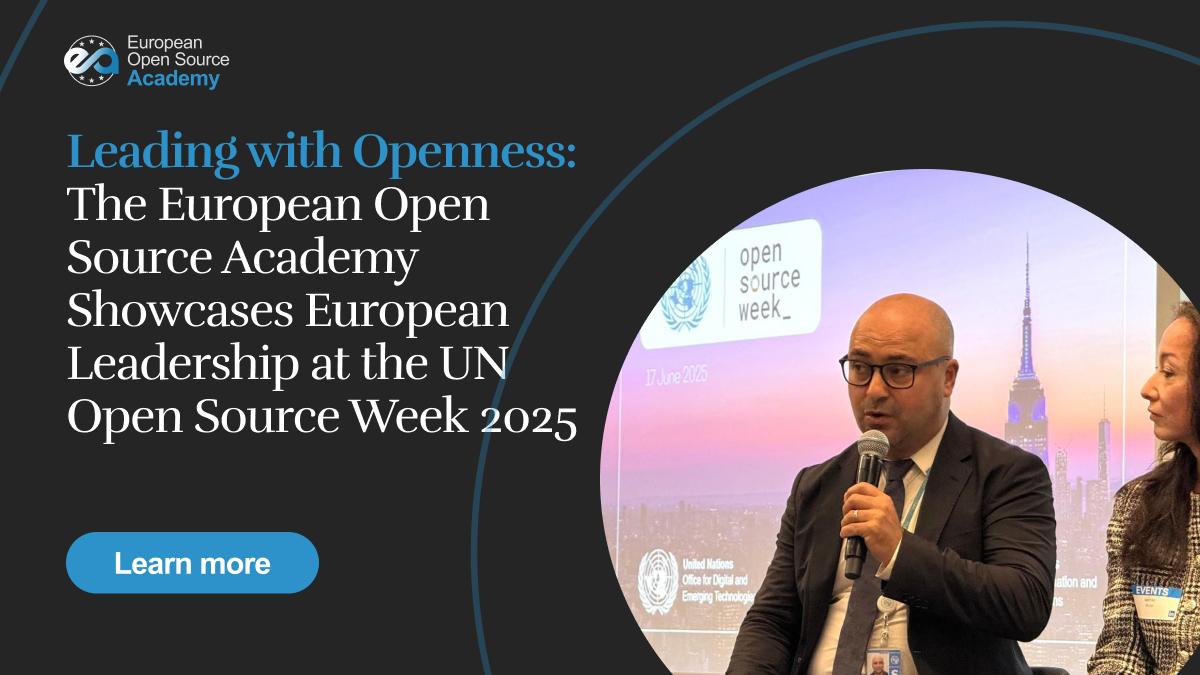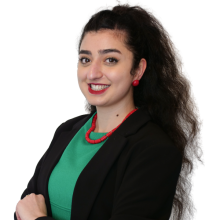In a world increasingly shaped by digital transformation, the United Nations (UN) Open Source Week – building on last year’s OSPOs for Good Symposium – has emerged as a vital convergence point for open technology leaders, practitioners, and visionaries. The UN Open Source Week 2025 offered more than inspiration; it delivered concrete action points, shared blueprints, and live demonstrations of how open source can solve problems at scale.
Throughout the week, European Open Source Academy (EOSA) members actively participated in panels, workshops, and hackathons, reinforcing the Academy’s core mission – to connect public sector needs with open source solutions, and to strengthen the skills and leadership needed to do so. Their presence reflected a growing appreciation for the Academy’s role in enabling governments, educators, and civil society to move from passive consumption to active stewardship of digital tools.
Session: Open Source Skills in the AI Era – Perspectives from the European Open Source Academy. From left to right: Walid Mathlouthi, Sachiko Muto, Joshua Tan, Amandine Le Pape, David Cuartielles and Nicholas Gates.
The European Open Source Academy as a vital contributor
With a packed program of high-impact sessions, hackathons, keynotes, and collaborative workshops, the week’s activities showcased a movement actively in motion.
The Academy co-sponsored the Side Events for the week on Tuesday evening and all day Friday. On this occasion, the Academy was represented by Business and Impact Section Lead Amandine Le Pape and Skills and Education Section Lead David Cuartielles, whose active engagement highlighted Europe's strategic commitment to open source as a lever for impact, change, and skills-building. Amandine and David also contributed to the week as a judge and mentor (respectively) for the UN Tech Over Hackathon on Monday.
The Academy’s involvement in the UN Open Source Week added a distinctly European perspective to the proceedings. The Academy champions public recognition of open source, and its contributions to the week underscored the leadership of many Europeans in attendance. The Academy’s presence also underlined the new institution’s practical and philosophical alignment with the UN’s vision for a capacity-focused vision for open source collaboration.
This was perhaps best evidenced in the Academy-organised session at LinkedIn on Tuesday, which focused on the need for Open Source Skills in the AI Era. Moderated by OFE’s Nicholas Gates, the panel brought together a dynamic group of thinkers and practitioners. These included Academy members Amandine Le Pape and David Cuartielles, alongside Walid Mathlouthi and Joshua Tan. The discussion explored how the convergence of open source, skills development, and AI demands new approaches to policy, education, and public sector leadership. Panelists highlighted that to thrive in an AI-driven world, Europe must not only adopt open technologies but cultivate the human expertise to govern, adapt, and build upon them.
Impressions of the Panel on “AI and the Future of Work: The ICT Sector in Transition.”
A spotlight on Europe’s open source leadership
The mission of the Academy was further evidenced by the Members’ other contributions throughout the week. Their combined voices illustrated Europe's twin emphasis on the vision and outcomes of openness in software development and computing – advocating not just for what open source is, but for what it enables in democratic societies.
Amandine, known for her work on secure and federated communication protocols, brought critical insights to sessions on decentralisation and digital sovereignty, where Mastodon and Matrix were examined as real-world examples of user-empowered digital infrastructure. Her advocacy for federated models served as a counterbalance to monolithic platforms, arguing persuasively for technological diversity, citizen control, and transparency.
Meanwhile, David – as the co-founder of Arduino and an advocate for open hardware and education – illuminated how open source fosters bottom-up innovation and inclusion, especially when aligned with education, civic tech, and regional development policies. Alongside other speakers, he spoke to practical applications of responsible AI from around the world, highlighting how open source is not just about code but about communities, competencies, and cultivating digital self-determination.
Other events throughout the week showcased Europe’s contributions to global digital cooperation, with hundreds of speakers and attendees joining from the European continent. Their presence demonstrates how homegrown European innovations are enriching the global open source ecosystem.
For example, Bastien Guerry from DINUM in France joined the week to discuss Docs, an open source document editor being developed as part of La Suite in France, part of their collaboration on sovereign digital workspaces with the Government of Germany. The Sovereign Tech Agency was there, sponsoring a Maintain-a-thon and showcasing the important work of open source maintenance being done by the STA’s beneficiaries, an example of European leadership. Finally, Mastodon appeared quite prominently in conversations around Digital Public Goods (DPGs) and Digital Public Infrastructure (DPI), represented by Board Member Hannah Aubry.
While these are just a few examples, they make clear how open source innovation and global digital cooperation are both being enabled by European leadership.
The power of open source: Key insights from the side events
On Friday, sessions focused on DPI, digital sovereignty and resiliency, capacity building, AI, and global priorities/SDGs. These events further demonstrated that open source is no longer just a technical strategy, it is a strategic imperative for digitalisation and political economy. Across the Side Events on Friday, panelists from institutions like the World Bank, Mercedes-Benz, the BBC, and various UN agencies discussed challenges ranging from procurement bottlenecks to sustainable funding, all while affirming the foundational role of open ecosystems.
For example, the track on "Digital Sovereignty in Practice" offered a rich and layered discussion on how open source can enable nations and institutions to shape their digital futures with greater confidence, flexibility, and inclusivity. For European participants – and especially the Academy – it marked a moment of visibility and growing recognition on the global stage. The discussions of digital sovereignty are front and center in Europe recently, and a lot of what European leaders are doing is influencing is expanding the aperture of the digital sovereignty conversation globally.
David brought invaluable perspectives to his own sessions at the Side Events, rooted in Europe’s long-standing engagement with open digital ecosystems. Amandine’s contributions highlighted the importance of decentralised and federated models in restoring user agency and trust, while David underscored the vital role of open hardware and education in fostering innovation and digital literacy from the ground up.
David Cuartielles speaking at the Side Events for UN Open Source Week
The conversations moved well beyond abstract policy to address real-world challenges and solutions – from funding models and procurement barriers to community engagement and sustainability. Panelists discussed the importance of building local capacity, creating new public-private partnerships, and supporting long-term open source maintenance. One theme was clear: if open source is to fulfill its public value promise, it must be recognised, resourced, and institutionalised across all layers of society.
Looking ahead
The week was a big step in showcasing the work of the Academy and demonstrated Europe’s growing leadership in the global open source movement. The contributions of EOSA members, alongside other European representatives, underscored a shared commitment to collaboration, public interest technology, and the creation of inclusive digital ecosystems. The active participation of institutions like the European Open Source Academy and individuals like Le Pape and Cuartielles affirmed that Europe is not only a contributor to this global dialogue, it is a catalyst.
Moving forward, the European Open Source Academy can continue to support global open source collaboration by raising awareness of these efforts, demonstrably improving public recognition of their societal impact, and fostering collaboration between governments, academia, and civic tech communities.
Follow us to stay updated on the Academy and its work in the open source ecosystem! More announcements will come in the weeks and months ahead regarding the Academy and the next edition of the European Open Source Awards in 2026.

